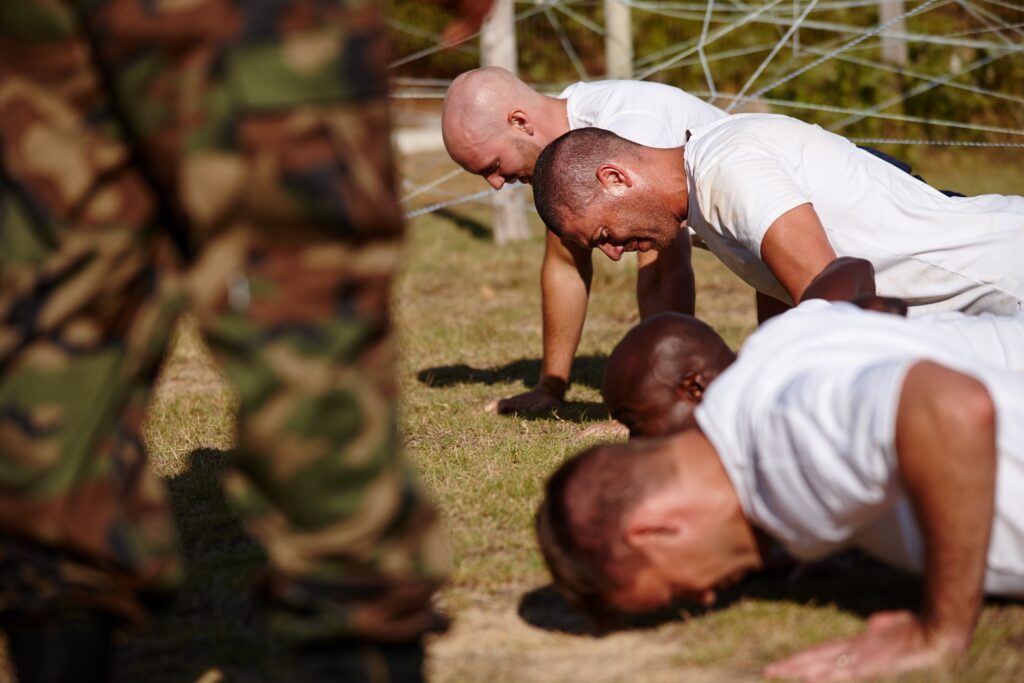You probably arrived at this post because you want to know definitively: “What not to say at C&P exam.”
Aw yes, an important topic.
If you’ve filed a claim for VA disability benefits, chances are the VA will schedule you for one or more Compensation and Pension (C&P) exams.
What is a C and P exam?
A C&P exam is a routine medical examination to evaluate your VA disability to include its origin and severity.
With that said, here are six pitfalls to avoid (things not to say) at your VA C&P exam, along with tips, strategies, and lessons learned.
Table of Contents
Tip #1. Don’t Skip Your C&P Exam

Translation: You must report to your scheduled C&P exam unless you have “Good Cause” for missing it.
We’ve heard rumors that some folks are telling veterans not to show up to their C&P exams.
They are wrong!
Don’t fall into this trap.
If you don’t attend your C&P exam, the VA Rater can either make a rating decision based on your submitted evidence alone or, in some circumstances, deny the claim.
Pro Tip: § 3.655 Failure to report for a VA C&P Exam. When entitlement or continued entitlement for VA disability benefits cannot be established or confirmed without a current VA examination, and the claimant fails to report without good cause, the VA Rater shall act in accordance with the table below.
| If the veteran fails to report for a C&P exam without “good cause” in connection with a(n): | Then the VA Rater should: |
| Original VA disability compensation claim, or New claim (for a new benefit or new disability) | – Decide the claim based on the evidence of record. |
| Increased evaluation claim, or Supplemental claim for a previously denied benefit, or Original claim for a benefit other than compensation | – Deny the claim. |
| C&P exam ordered to assess continuing entitlement when there is a running award | – Discontinue payment for the benefit, or – Reduce payment for the disability for which examination was scheduled to a Minimum evaluation established under 38 CFR Part 4, or – Lower protected evaluation under 38 CFR 3.951(b). Important Notes: – Discontinuance or termination is only finalized after due process, as provided in M21-1, Part IV, Subpart ii, 2.B. – Reduction or discontinuance will not be finalized when the claimant submits evidence during the proposed reduction period justifying continuation of the benefit or indicates a willingness to report for examination. |
What Happens If You Miss a C&P Exam?

If you miss a C&P exam, the VA Rater can either deny the claim or decide it based on the evidence of record.
You should not miss your C&P exam unless you have “Good Cause” for doing so.
Good cause means a reason that justifies your failure to report for the VA C&P examination.
The VA will generally accept any reason offered by the individual as “good cause” for his/her failure to report for an exam.
Examples of good cause include but are not limited to, illness or hospitalization of the claimant or death of an immediate family member.
Exceptions: Good cause is not established if the claimant
- Fails to provide any reason for failing to report, or
- Indicates he/she did not receive notice of the examination.
References: For more information on
- Effect of non-cooperation on the duty to provide an examination or opinion, see M21-1, Part IV, Subpart i, 2.G.1.a
- Allegations of non-receipt of examination notice, see M21-1, Part IV, Subpart i, 2.G.1.e, and
- Cases where a claimant expresses a willingness to report for examination, see M21-1, Part IV, Subpart i, 2.G.1.f.
What Not to Say at C&P Exam Tip #2. Don’t Lie or Stretch the Truth

This is a big one.
Don’t ever lie or stretch the truth when it comes to your VA disability claim.
At your C&P exam, you should think, look, act, and speak as you would on a normal day.
What does this mean?
Here’s a few examples:
- If you don’t require the daily use of braces or a walker, don’t just pull them out for your C&P exam. Do what you would normally do.
- If you usually shower and dress decently, do so on the day of your exam. We recommend you wear comfortable clothing such as sweatpants and a T-shirt. If you’re reporting to the exam from work, wear what you normally wear for work.
- If you’re able to lift weights and work out, tell the examiner the truth. Don’t say you can’t lift more than 10 lbs. if you’re at the gym using 40 lbs. dumbbells.
Pro Tip: A C&P examiner might write that you’re malingering if you attempt to falsify or exaggerate your disability symptoms/impairment. Malingering is defined as “the intentional production of false or grossly exaggerated physical or psychological symptoms motivated by external incentives such as avoiding military duty, avoiding work, obtaining financial compensation, etc.”
Important: According to federal law, there are criminal penalties, including a fine and/or imprisonment for up to 5 years for withholding information or for knowingly providing incorrect information in support of your VA disability compensation claim for VA benefits (See 18 U.S. Code § 1001).
Tip #3. Don’t Forget to Explain How Your Disability Is Service Connected

To receive VA disability compensation benefits, your disabilities must be “service connected.”
Generally, there are five types of service connection, and you should tell the C&P examiner why and how your disabilities are service-connected (if they aren’t already).
#1. Direct Service Connection
This is the most common method of service connection for VA disability compensation benefits.
You’re telling the VA that your current disability condition is the direct result of your active duty military service.
Perhaps it was a training incident, car accident, combat deployment, stress from the job, or other in-service incident, injury, event, or disease that directly caused or made your current disability condition worse.
An example is combat PTSD due to an IED attack in Afghanistan.
The PTSD is due to your combat deployment, which is “directly” related to your military service.
You should be able to explain to the C&P examiner when your disability began (within a 60-day window).
#2. Secondary Service Connection
In accordance with 38 CFR § 3.310 current disability condition that is proximately due to or the result of a service-connected disease or injury shall also be service-connected.
Let’s say, for example, you developed ringing in your ears, called “Tinnitus” while serving.
Today, even though you are no longer serving, that service-connected Tinnitus might be causing Migraines, Anxiety, and/or Depression.
Service connection on a secondary basis requires a “showing of causation.”
Instead of proving that your disability is directly service-connected, you’ll need to prove that it’s caused or made worse by a different disability (which is service-connected).
In this example, you could file a VA disability claim for Migraines secondary to Tinnitus.
Pro Tip: A Nexus Letter is highly recommended to help you prove secondary service connection under the law. >> Click HERE NOW << to sign up for our premier education-based Coaching/Consulting program VA Claims Insider Elite, start free today, connect with a Veteran Coach in minutes, and get high-quality Nexus Letters at reduced rates (if wanted and warranted by the evidence of record).
Reference: >> Click HERE to Download Our FREE eBook of 100+ Conditions for Secondary Service Connection!
#3. Presumptive Service Connection
If your disability condition meets certain criteria (set forth by Congress), then your disability condition will be “presumed” to have been caused by military service.
Examples include certain chronic debilitating diseases, diseases specific to radiation exposure, diseases associated with herbicide agents (to include Blue Water Veterans), Persian Gulf War Veterans and Burn Pit Exposures, and Camp Lejeune Veterans.
38 CFR § 3.309 discusses diseases subject to presumptive service-connection in more detail.
Pro Tip: While you are not required to provide a “Nexus” to establish presumptive service connection, it’s highly recommended that you at least write a personal statement as to WHY you think your disability meets the legal requirements for presumptive service connection. You might want to obtain a medical nexus letter as well.
#4. Service Connection by Aggravation
Sometimes a pre-existing condition is worsened by military service.
For example, a veteran may have had flat feet prior to entering service but wearing military boots and prolonged standing worsened his or her flat feet leading to a painful disability called plantar fasciitis, which is eligible for compensation under the law.
Additionally, if a veteran has a service-connected knee condition that aggravates a non-service-connected back condition, they could get service connection for their back based on aggravation—provided they can prove that their condition was worsened beyond its natural progression by military service.
#5. Service Connection by 38 U.S.C 1151
This refers to disabilities or death that result from “hospital care, medical or surgical treatment, or examination” by a VA medical professional or facility, or due to participation in a program of vocational rehabilitation.
In our experience, this type of service connection is uncommon.
Tip #4. Don’t Downplay Your Symptoms

This is critical to remember so you get the VA disability rating you deserve!
In our experience, veterans tend to downplay their symptoms.
Avoid this mistake at all costs.
Don’t say you’re fine if you’re not…
It’s okay not to be okay!
Maybe you’re struggling so much that you start crying during your C&P exam (that’s okay, it can get emotional).
If you aren’t “uncomfortably vulnerable” and don’t tell the C&P examiner how you are on your worst days, there’s a high likelihood that your VA claim will either get denied or you’ll end up underrated.
Being “uncomfortably vulnerable” means telling the examiner things you don’t want to (and being okay with it).
If it’s uncomfortable or awkward for you to say, YOU NEED TO SAY IT!
- If your mental health medications cause Erectile Dysfunction (ED) or Female Sexual Arousal Disorder (FSAD), tell the examiner.
- If you’re self-medicating with alcohol and/or drugs to avoid physical and mental pain, tell the examiner.
- If your disabilities negatively affect your work, life, or relationships, tell the examiner why and how.
Pro Tip: Read through your submitted evidence to include any medical records, personal statements, buddy letters, etc. This will help refresh your memory of your disabilities prior to your C&P exam. You should also review the condition-specific DBQ form for the condition you’ve filed for.
Tip #5. Don’t Understate Your Level of Occupational and Social Impairment

This is like “don’t downplay your symptoms,” except it relates to your work, life, and social functioning.
If your disability causes issues with your work (e.g., reasonable accommodation, increased sick leave, trouble with boss or co-workers) you need to tell the C&P examiner.
Maybe you’ve taken increased sick leave because of your Migraines or perhaps you have a reasonable accommodation to work from home because of your PTSD.
In addition, if your disability causes problems with your social life and/or relationships, be sure to explain it to the examiner.
Maybe your Anxiety is so severe that you rarely leave your home and don’t have many friends or meaningful relationships.
Or maybe you’re separated or divorced because of your anger and mood instability.
If you’re going for Total Disability Individual Unemployability (TDIU), explain why and how you can no longer hold substantially gainful employment because of your disabilities.
Range of Motion VA C&P Exam Tip #6. Don’t Push Through the Pain on Range of Motion Exams

If you’ve filed for a physical disability (muscuoloskeltal related), the examiner will likely perform a Range of Motion VA C&P exam with a goniometer.
Don’t push through the pain like you were taught to do in the military.
Make the examiner STOP when you feel discomfort.
If you can’t bend or move a certain way, tell the examiner.
If you have pain upon movement, tell the examiner.
This is not the time to downplay painful motion—this is your chance to explain to the C&P examiner your physical discomfort and how your disabilities are negatively affecting you.
About the Author

Brian Reese
Brian Reese is one of the top VA disability benefits experts in the world and bestselling author of You Deserve It: The Definitive Guide to Getting the Veteran Benefits You’ve Earned (Second Edition).
Brian’s frustration with the VA claim process led him to create VA Claims Insider, which provides disabled veterans with tips, strategies, and lessons learned to win their VA disability compensation claim, faster, even if they’ve already filed, been denied, gave up, or don’t know where to start.
As the founder of VA Claims Insider and CEO of Military Disability Made Easy, he has helped serve more than 10 million military members and veterans since 2013 through free online educational resources.
He is a former active duty Air Force officer with extensive experience leading hundreds of individuals and multi-functional teams in challenging international environments, including a combat tour to Afghanistan in 2011 supporting Operation ENDURING FREEDOM.
Brian is a Distinguished Graduate of Management from the United States Air Force Academy, Colorado Springs, CO, and he holds an MBA from Oklahoma State University’s Spears School of Business, Stillwater, OK, where he was a National Honor Scholar (Top 1% of Graduate School class).



